A Comprehensive Report on the Digitization of the Oil and Gas Industry
VerifiedAdded on 2021/04/21
|6
|1460
|122
Report
AI Summary
This report examines the digitization of the oil and gas industry, highlighting the shift towards digital processes and methods to enhance production capacity and reduce costs. It discusses the concept of digital disruption and its potential to transform the industry, emphasizing the use of technologies like robotics and AI to increase efficiency, reduce human error, and lower operational expenses. The report cites examples of companies adopting digital solutions, such as JOYN software, and explores the benefits of increased production levels and improved quality control. It also addresses the socio-environmental and social implications of digitization, including potential environmental degradation and job displacement, while acknowledging the positive impact on productivity and the workforce's role in maintaining automated systems. The conclusion underscores the importance of embracing digital means for growth and development in the oil and gas sector, while carefully managing associated risks.
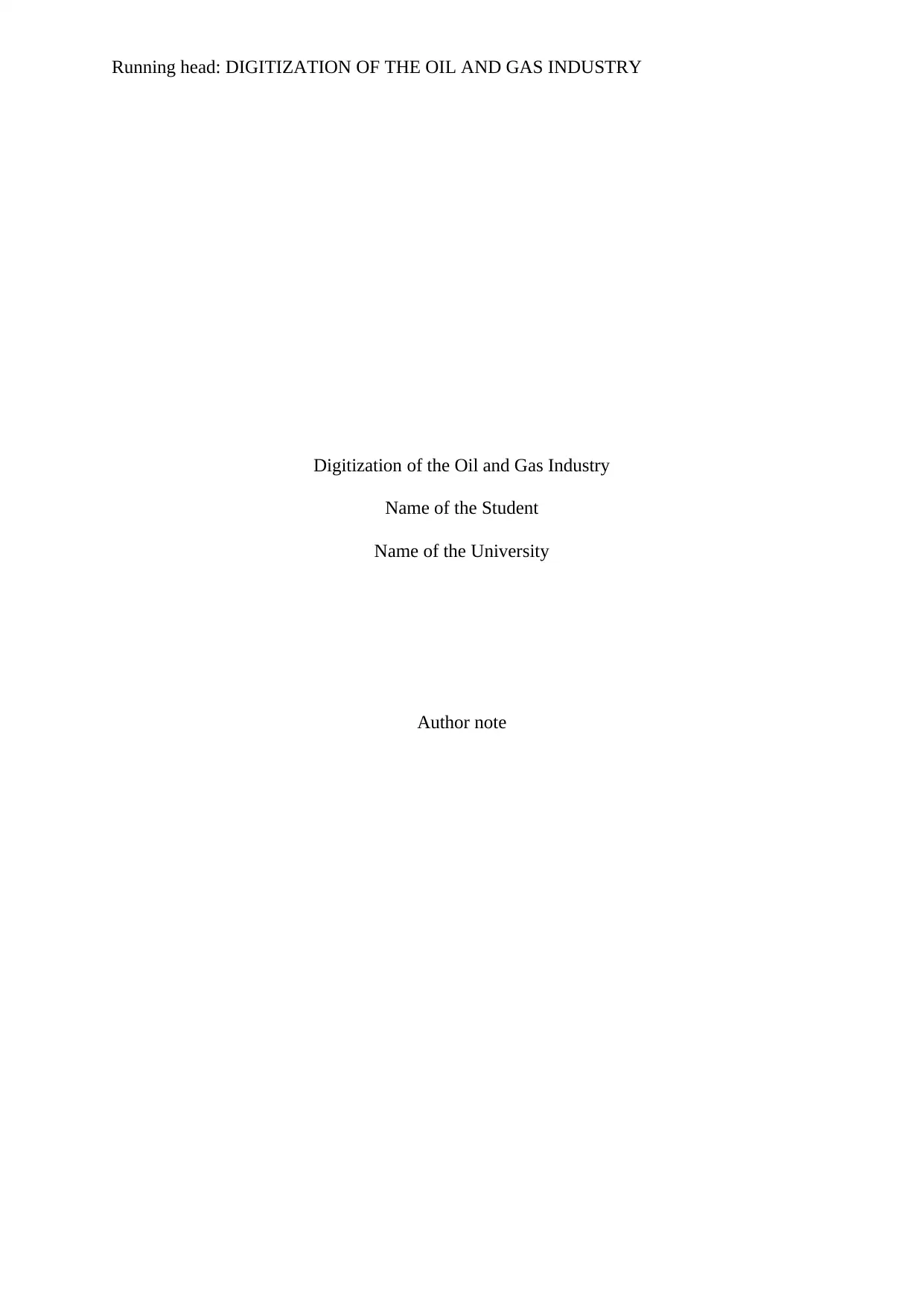
Running head: DIGITIZATION OF THE OIL AND GAS INDUSTRY
Digitization of the Oil and Gas Industry
Name of the Student
Name of the University
Author note
Digitization of the Oil and Gas Industry
Name of the Student
Name of the University
Author note
Paraphrase This Document
Need a fresh take? Get an instant paraphrase of this document with our AI Paraphraser
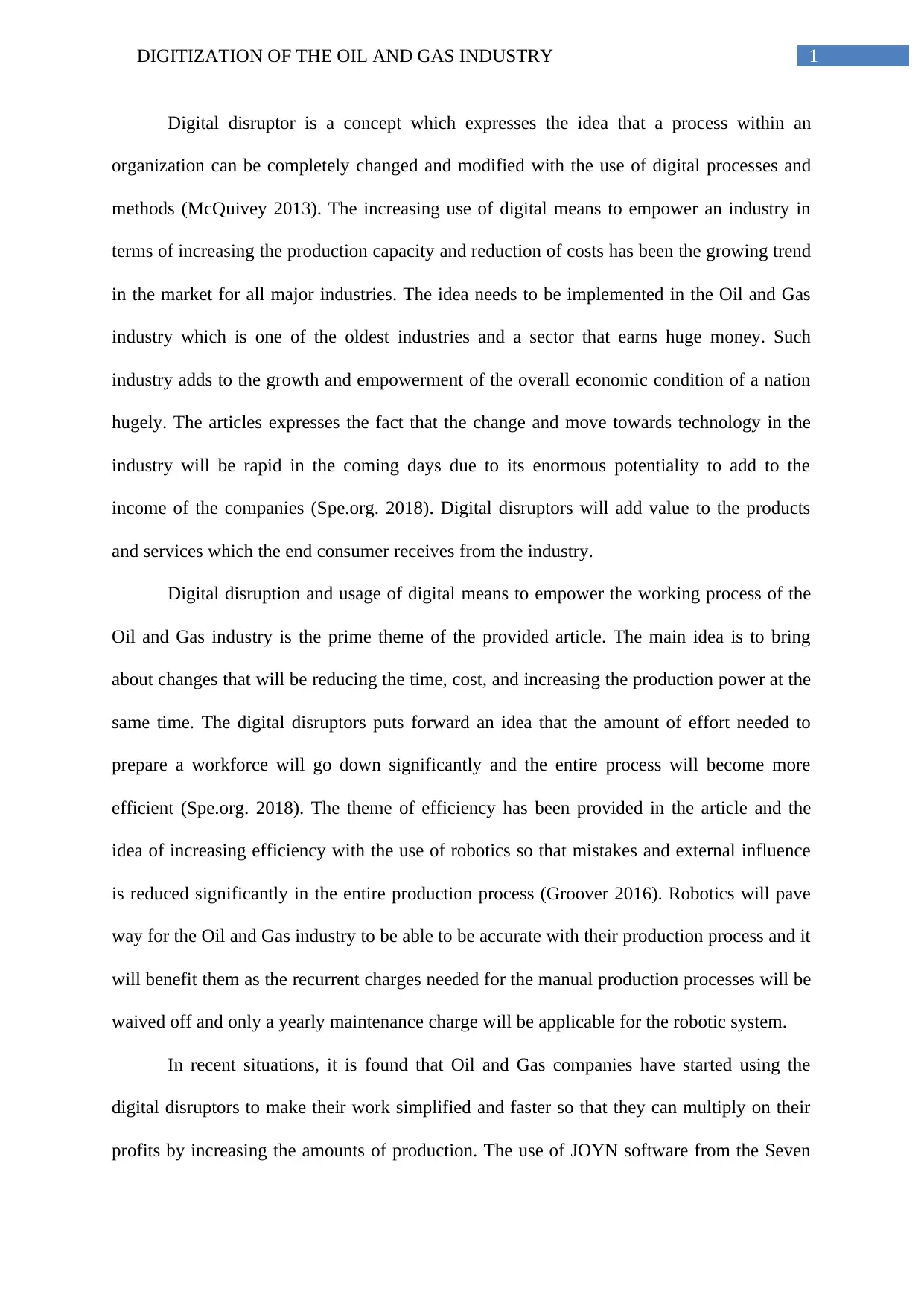
1DIGITIZATION OF THE OIL AND GAS INDUSTRY
Digital disruptor is a concept which expresses the idea that a process within an
organization can be completely changed and modified with the use of digital processes and
methods (McQuivey 2013). The increasing use of digital means to empower an industry in
terms of increasing the production capacity and reduction of costs has been the growing trend
in the market for all major industries. The idea needs to be implemented in the Oil and Gas
industry which is one of the oldest industries and a sector that earns huge money. Such
industry adds to the growth and empowerment of the overall economic condition of a nation
hugely. The articles expresses the fact that the change and move towards technology in the
industry will be rapid in the coming days due to its enormous potentiality to add to the
income of the companies (Spe.org. 2018). Digital disruptors will add value to the products
and services which the end consumer receives from the industry.
Digital disruption and usage of digital means to empower the working process of the
Oil and Gas industry is the prime theme of the provided article. The main idea is to bring
about changes that will be reducing the time, cost, and increasing the production power at the
same time. The digital disruptors puts forward an idea that the amount of effort needed to
prepare a workforce will go down significantly and the entire process will become more
efficient (Spe.org. 2018). The theme of efficiency has been provided in the article and the
idea of increasing efficiency with the use of robotics so that mistakes and external influence
is reduced significantly in the entire production process (Groover 2016). Robotics will pave
way for the Oil and Gas industry to be able to be accurate with their production process and it
will benefit them as the recurrent charges needed for the manual production processes will be
waived off and only a yearly maintenance charge will be applicable for the robotic system.
In recent situations, it is found that Oil and Gas companies have started using the
digital disruptors to make their work simplified and faster so that they can multiply on their
profits by increasing the amounts of production. The use of JOYN software from the Seven
Digital disruptor is a concept which expresses the idea that a process within an
organization can be completely changed and modified with the use of digital processes and
methods (McQuivey 2013). The increasing use of digital means to empower an industry in
terms of increasing the production capacity and reduction of costs has been the growing trend
in the market for all major industries. The idea needs to be implemented in the Oil and Gas
industry which is one of the oldest industries and a sector that earns huge money. Such
industry adds to the growth and empowerment of the overall economic condition of a nation
hugely. The articles expresses the fact that the change and move towards technology in the
industry will be rapid in the coming days due to its enormous potentiality to add to the
income of the companies (Spe.org. 2018). Digital disruptors will add value to the products
and services which the end consumer receives from the industry.
Digital disruption and usage of digital means to empower the working process of the
Oil and Gas industry is the prime theme of the provided article. The main idea is to bring
about changes that will be reducing the time, cost, and increasing the production power at the
same time. The digital disruptors puts forward an idea that the amount of effort needed to
prepare a workforce will go down significantly and the entire process will become more
efficient (Spe.org. 2018). The theme of efficiency has been provided in the article and the
idea of increasing efficiency with the use of robotics so that mistakes and external influence
is reduced significantly in the entire production process (Groover 2016). Robotics will pave
way for the Oil and Gas industry to be able to be accurate with their production process and it
will benefit them as the recurrent charges needed for the manual production processes will be
waived off and only a yearly maintenance charge will be applicable for the robotic system.
In recent situations, it is found that Oil and Gas companies have started using the
digital disruptors to make their work simplified and faster so that they can multiply on their
profits by increasing the amounts of production. The use of JOYN software from the Seven
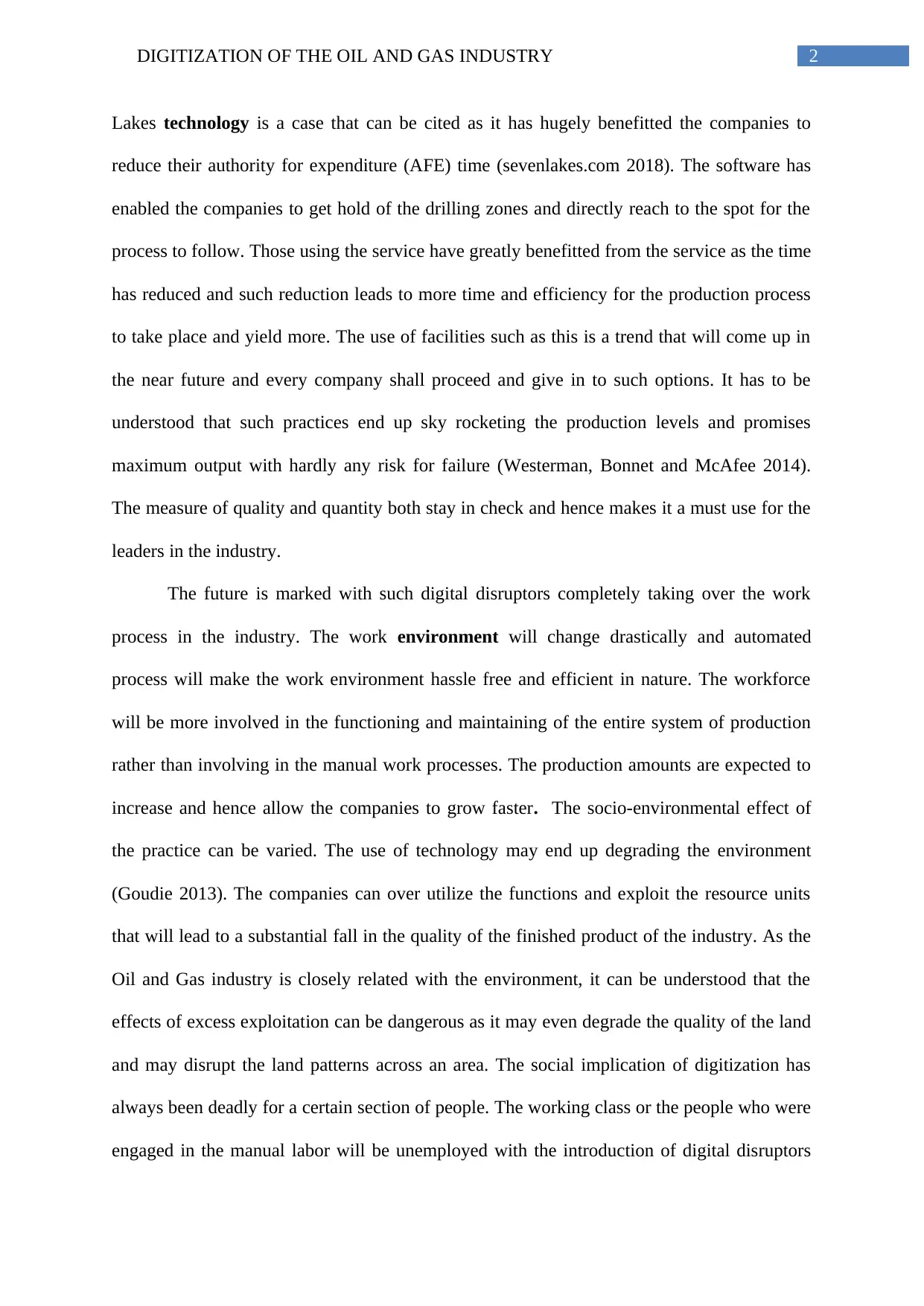
2DIGITIZATION OF THE OIL AND GAS INDUSTRY
Lakes technology is a case that can be cited as it has hugely benefitted the companies to
reduce their authority for expenditure (AFE) time (sevenlakes.com 2018). The software has
enabled the companies to get hold of the drilling zones and directly reach to the spot for the
process to follow. Those using the service have greatly benefitted from the service as the time
has reduced and such reduction leads to more time and efficiency for the production process
to take place and yield more. The use of facilities such as this is a trend that will come up in
the near future and every company shall proceed and give in to such options. It has to be
understood that such practices end up sky rocketing the production levels and promises
maximum output with hardly any risk for failure (Westerman, Bonnet and McAfee 2014).
The measure of quality and quantity both stay in check and hence makes it a must use for the
leaders in the industry.
The future is marked with such digital disruptors completely taking over the work
process in the industry. The work environment will change drastically and automated
process will make the work environment hassle free and efficient in nature. The workforce
will be more involved in the functioning and maintaining of the entire system of production
rather than involving in the manual work processes. The production amounts are expected to
increase and hence allow the companies to grow faster. The socio-environmental effect of
the practice can be varied. The use of technology may end up degrading the environment
(Goudie 2013). The companies can over utilize the functions and exploit the resource units
that will lead to a substantial fall in the quality of the finished product of the industry. As the
Oil and Gas industry is closely related with the environment, it can be understood that the
effects of excess exploitation can be dangerous as it may even degrade the quality of the land
and may disrupt the land patterns across an area. The social implication of digitization has
always been deadly for a certain section of people. The working class or the people who were
engaged in the manual labor will be unemployed with the introduction of digital disruptors
Lakes technology is a case that can be cited as it has hugely benefitted the companies to
reduce their authority for expenditure (AFE) time (sevenlakes.com 2018). The software has
enabled the companies to get hold of the drilling zones and directly reach to the spot for the
process to follow. Those using the service have greatly benefitted from the service as the time
has reduced and such reduction leads to more time and efficiency for the production process
to take place and yield more. The use of facilities such as this is a trend that will come up in
the near future and every company shall proceed and give in to such options. It has to be
understood that such practices end up sky rocketing the production levels and promises
maximum output with hardly any risk for failure (Westerman, Bonnet and McAfee 2014).
The measure of quality and quantity both stay in check and hence makes it a must use for the
leaders in the industry.
The future is marked with such digital disruptors completely taking over the work
process in the industry. The work environment will change drastically and automated
process will make the work environment hassle free and efficient in nature. The workforce
will be more involved in the functioning and maintaining of the entire system of production
rather than involving in the manual work processes. The production amounts are expected to
increase and hence allow the companies to grow faster. The socio-environmental effect of
the practice can be varied. The use of technology may end up degrading the environment
(Goudie 2013). The companies can over utilize the functions and exploit the resource units
that will lead to a substantial fall in the quality of the finished product of the industry. As the
Oil and Gas industry is closely related with the environment, it can be understood that the
effects of excess exploitation can be dangerous as it may even degrade the quality of the land
and may disrupt the land patterns across an area. The social implication of digitization has
always been deadly for a certain section of people. The working class or the people who were
engaged in the manual labor will be unemployed with the introduction of digital disruptors
⊘ This is a preview!⊘
Do you want full access?
Subscribe today to unlock all pages.

Trusted by 1+ million students worldwide
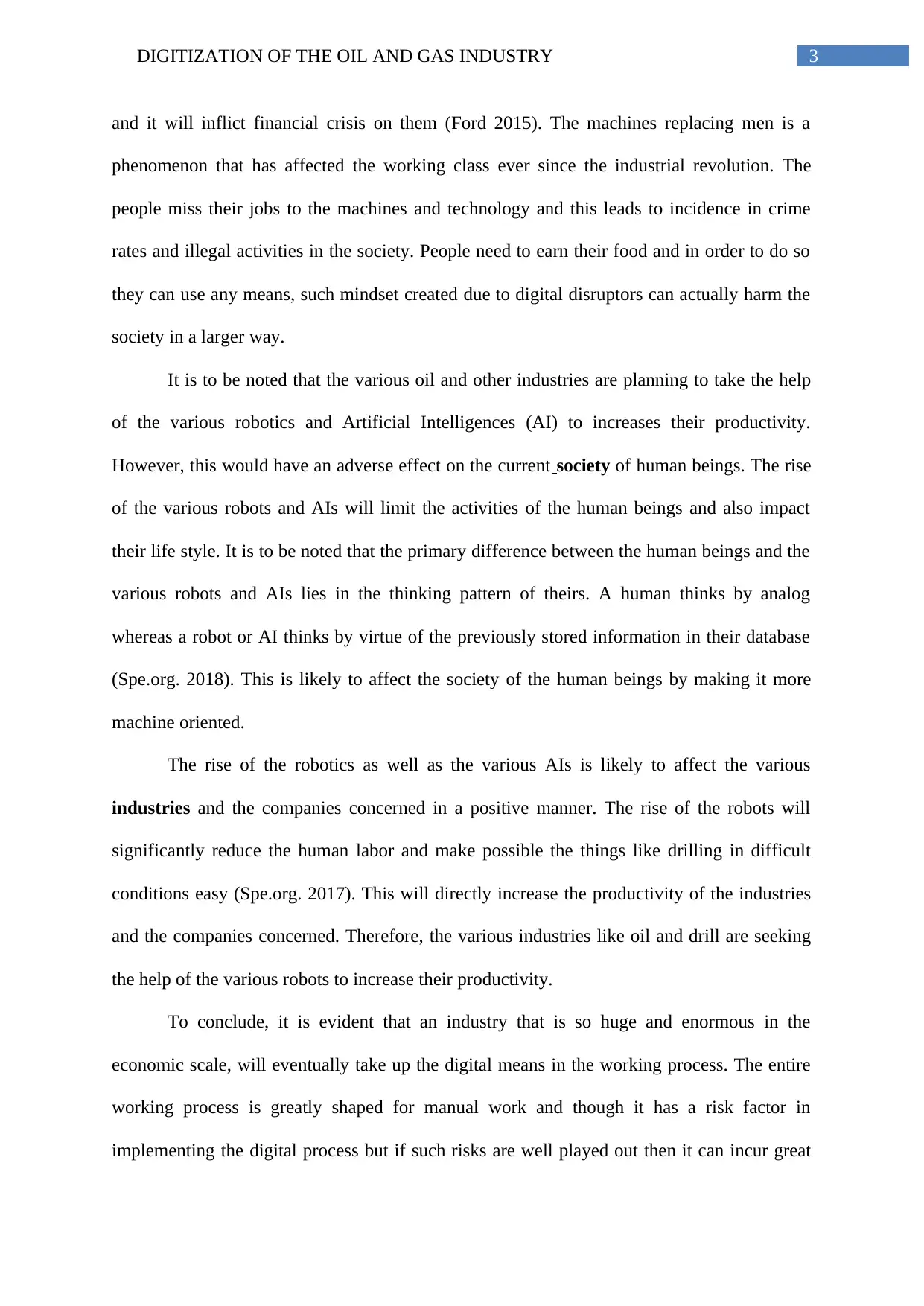
3DIGITIZATION OF THE OIL AND GAS INDUSTRY
and it will inflict financial crisis on them (Ford 2015). The machines replacing men is a
phenomenon that has affected the working class ever since the industrial revolution. The
people miss their jobs to the machines and technology and this leads to incidence in crime
rates and illegal activities in the society. People need to earn their food and in order to do so
they can use any means, such mindset created due to digital disruptors can actually harm the
society in a larger way.
It is to be noted that the various oil and other industries are planning to take the help
of the various robotics and Artificial Intelligences (AI) to increases their productivity.
However, this would have an adverse effect on the current society of human beings. The rise
of the various robots and AIs will limit the activities of the human beings and also impact
their life style. It is to be noted that the primary difference between the human beings and the
various robots and AIs lies in the thinking pattern of theirs. A human thinks by analog
whereas a robot or AI thinks by virtue of the previously stored information in their database
(Spe.org. 2018). This is likely to affect the society of the human beings by making it more
machine oriented.
The rise of the robotics as well as the various AIs is likely to affect the various
industries and the companies concerned in a positive manner. The rise of the robots will
significantly reduce the human labor and make possible the things like drilling in difficult
conditions easy (Spe.org. 2017). This will directly increase the productivity of the industries
and the companies concerned. Therefore, the various industries like oil and drill are seeking
the help of the various robots to increase their productivity.
To conclude, it is evident that an industry that is so huge and enormous in the
economic scale, will eventually take up the digital means in the working process. The entire
working process is greatly shaped for manual work and though it has a risk factor in
implementing the digital process but if such risks are well played out then it can incur great
and it will inflict financial crisis on them (Ford 2015). The machines replacing men is a
phenomenon that has affected the working class ever since the industrial revolution. The
people miss their jobs to the machines and technology and this leads to incidence in crime
rates and illegal activities in the society. People need to earn their food and in order to do so
they can use any means, such mindset created due to digital disruptors can actually harm the
society in a larger way.
It is to be noted that the various oil and other industries are planning to take the help
of the various robotics and Artificial Intelligences (AI) to increases their productivity.
However, this would have an adverse effect on the current society of human beings. The rise
of the various robots and AIs will limit the activities of the human beings and also impact
their life style. It is to be noted that the primary difference between the human beings and the
various robots and AIs lies in the thinking pattern of theirs. A human thinks by analog
whereas a robot or AI thinks by virtue of the previously stored information in their database
(Spe.org. 2018). This is likely to affect the society of the human beings by making it more
machine oriented.
The rise of the robotics as well as the various AIs is likely to affect the various
industries and the companies concerned in a positive manner. The rise of the robots will
significantly reduce the human labor and make possible the things like drilling in difficult
conditions easy (Spe.org. 2017). This will directly increase the productivity of the industries
and the companies concerned. Therefore, the various industries like oil and drill are seeking
the help of the various robots to increase their productivity.
To conclude, it is evident that an industry that is so huge and enormous in the
economic scale, will eventually take up the digital means in the working process. The entire
working process is greatly shaped for manual work and though it has a risk factor in
implementing the digital process but if such risks are well played out then it can incur great
Paraphrase This Document
Need a fresh take? Get an instant paraphrase of this document with our AI Paraphraser

4DIGITIZATION OF THE OIL AND GAS INDUSTRY
advantages to the companies. The economic growth can be increased by huge sum and the
production level will reach sky high. The leading companies need to put their faith in the
situation so that the development takes place and the growth increases in the near future.
advantages to the companies. The economic growth can be increased by huge sum and the
production level will reach sky high. The leading companies need to put their faith in the
situation so that the development takes place and the growth increases in the near future.
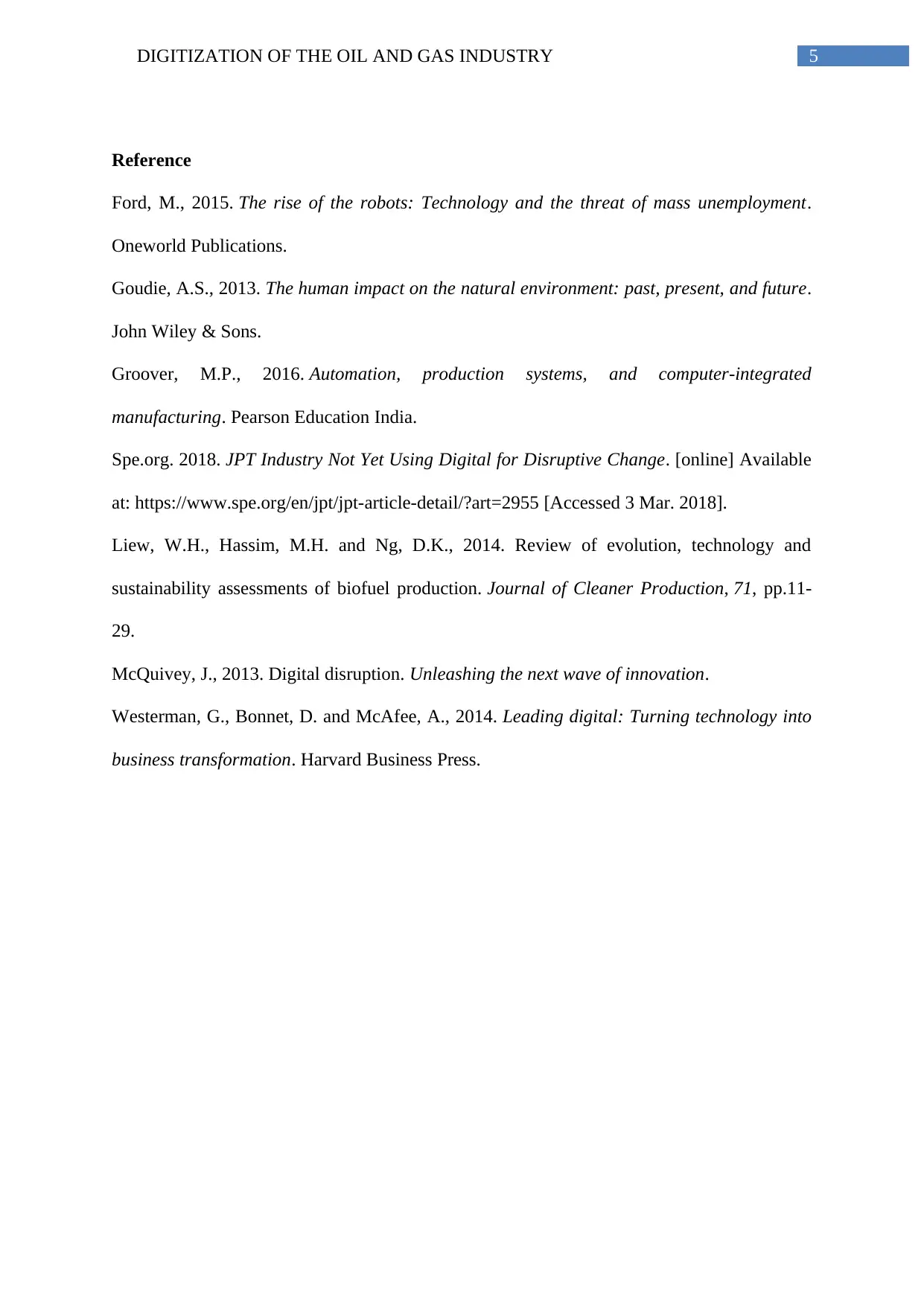
5DIGITIZATION OF THE OIL AND GAS INDUSTRY
Reference
Ford, M., 2015. The rise of the robots: Technology and the threat of mass unemployment.
Oneworld Publications.
Goudie, A.S., 2013. The human impact on the natural environment: past, present, and future.
John Wiley & Sons.
Groover, M.P., 2016. Automation, production systems, and computer-integrated
manufacturing. Pearson Education India.
Spe.org. 2018. JPT Industry Not Yet Using Digital for Disruptive Change. [online] Available
at: https://www.spe.org/en/jpt/jpt-article-detail/?art=2955 [Accessed 3 Mar. 2018].
Liew, W.H., Hassim, M.H. and Ng, D.K., 2014. Review of evolution, technology and
sustainability assessments of biofuel production. Journal of Cleaner Production, 71, pp.11-
29.
McQuivey, J., 2013. Digital disruption. Unleashing the next wave of innovation.
Westerman, G., Bonnet, D. and McAfee, A., 2014. Leading digital: Turning technology into
business transformation. Harvard Business Press.
Reference
Ford, M., 2015. The rise of the robots: Technology and the threat of mass unemployment.
Oneworld Publications.
Goudie, A.S., 2013. The human impact on the natural environment: past, present, and future.
John Wiley & Sons.
Groover, M.P., 2016. Automation, production systems, and computer-integrated
manufacturing. Pearson Education India.
Spe.org. 2018. JPT Industry Not Yet Using Digital for Disruptive Change. [online] Available
at: https://www.spe.org/en/jpt/jpt-article-detail/?art=2955 [Accessed 3 Mar. 2018].
Liew, W.H., Hassim, M.H. and Ng, D.K., 2014. Review of evolution, technology and
sustainability assessments of biofuel production. Journal of Cleaner Production, 71, pp.11-
29.
McQuivey, J., 2013. Digital disruption. Unleashing the next wave of innovation.
Westerman, G., Bonnet, D. and McAfee, A., 2014. Leading digital: Turning technology into
business transformation. Harvard Business Press.
⊘ This is a preview!⊘
Do you want full access?
Subscribe today to unlock all pages.

Trusted by 1+ million students worldwide
1 out of 6
Related Documents
Your All-in-One AI-Powered Toolkit for Academic Success.
+13062052269
info@desklib.com
Available 24*7 on WhatsApp / Email
![[object Object]](/_next/static/media/star-bottom.7253800d.svg)
Unlock your academic potential
Copyright © 2020–2025 A2Z Services. All Rights Reserved. Developed and managed by ZUCOL.




